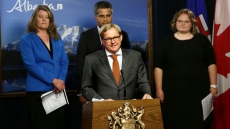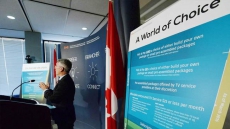Philadelphia became the first major American city with a soda tax on Thursday despite a multimillion-dollar campaign by the beverage industry to block it.
The City Council gave final approval to a 1.5 cent-per-ounce tax on sugary and diet beverages. The tax is set to take effect Jan. 1.
Only Berkeley, California, has a similar law. Soda tax proposals have failed in more than 30 cities and states in recent years, including twice in Philadelphia. Such plans are typically criticized as disproportionately affecting the poor, who are more likely to consume sugary drinks.
Democratic Mayor Jim Kenney sold the council on the idea with a plan to spend most of the estimated $90 million in new tax revenue next year to pay for prekindergarten, community schools and recreation centres.
"Thanks to the tireless advocacy of educators, parents, rec centre volunteers and so many others, Philadelphia made a historic investment in our neighbourhoods and in our education system today," he said.
The tax, which passed 13-4, was a hard-fought win for the city. The soda industry spent millions of dollars in advertising against it, arguing it will be costly to consumers. The plan also attracted national attention and dollars, with former New York Mayor Michael Bloomberg and Texas billionaires John and Laura Arnold, advocates for less consumption of sugary drinks, funding ads in support.
The American Beverage Association called the soda tax "discriminatory and highly unpopular."
"The tax passed today is a regressive tax that unfairly singles out beverages, including low- and no-calorie choices," it said a statement.
The association and beverage bottling businessman Harold Honickman promised to fight the tax in court, with Honickman saying the tax would mean sales will go down and jobs will be lost. He said he could file a lawsuit as soon as this weekend.
Teamsters Local 830 secretary-treasurer Daniel Grace agreed a legal battle is ahead.
Many communities where soda tax proposals have failed sought it as a way to discourage consumers from buying sugary beverages for health reasons.
The case could certainly be made for a healthier Philadelphia, where more than 68 per cent of adults and 41 per cent of children are overweight or obese. But Kenney focused on public interest over public health.
He said last week that Americans generally reject other people telling them what's healthy for them, so his administration tried to stay away from that. He said any health benefits coming from the tax are a bonus.
Though the tax won't start getting collected until 2017, it will be included in the fiscal budget that starts July 1.
The tax will be levied on distributors. If they pass it entirely on to consumers, the cost of a 12-ounce can of soda would go up 18 cents. A six-pack of 16-ounce bottles would go up $1.44. Those extra charges would be much higher than the regular sales taxes imposed on soda by many states and some other cities.
Some of the money raised by the tax will go to pay for city employee benefits and pet projects of council members and to boost municipal budget reserves.
Groups of pre-K students clustered outside City Hall on Thursday doing geyser experiments with soda and Mentos, and they gathered in the hallway near chambers with headbands reading "Pre-K rocks!"
The No Philly Grocery Tax group had a big display on the plaza with stacks of drinks and graphs showing how much consumers will have to pay.


